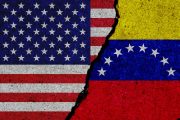
On October 6, the U.S. Department of Commerce announced novel trade sanctions on 42 Chinese firms that it criticized for supplying critical resources, such as integrated circuits used in missile guidance systems, to Russia amid its conflict with Ukraine.
This recent declaration includes various Chinese entities and one from each of Estonia, Finland, Germany, India, Türkiye, the U.K., and the United Arab Emirates (UAE), to America’s current export-control list. U.S. exporters need special licenses, which can be challenging to get, to transport goods to customers on the export-control list.
Furthermore, the export-control list marks Washington’s attempts to halt top U.S.-derived technology from being handed over to the Russian military. The companies included in the export-control list last week contribute to a “significant portion” of the U.S.-derived integrated circuits that have ended up in Russia this year, the Commerce Department posited.
“Today’s additions to the entity list provide a clear message: If you supply the Russian defense sector with US-origin technology, we will find out, and we will take action,” Assistant Secretary of Commerce Matthew Axelrod asserted.
“We will not hesitate to act against parties, wherever located, that facilitate the sale of U.S.-origin items to Russia’s military for its war against Ukraine,” Commerce Department official Alan Estevez proclaimed. “No matter how convoluted the trail may be or how many hands items are passing through, if US-origin items are finding their way to Russia’s military, we will work tirelessly to stop it.”
Moreover, the United States maintained that it would continue cooperation with allies abroad to detect firms that are re-exporting U.S. goods to Russia’s defense industry.
A U.S. intelligence report published in July alleged that China was offering key support for Russia’s military operations in Ukraine, such as navigation equipment and other technology with both defense and civilian applications. Chinese officials have insisted that Beijing did not sell arms to either Russia or Ukraine, and it “prudently handles the export of dual-use items in accordance with laws and regulations.” Besides, the Chinese embassy in Washington reiterated China’s trade ties with Russia are “above-board” and “shall be free from disruption or coercion by any third party.”
In April this year, The Washington Post contended that China had authorized the supply of “lethal aid” to Russia, quoting a purported intercept of Russian communications indicated in a classified Pentagon document. Notably, the document itself was reportedly discovered on a gaming forum and had not been hitherto singled out among media reports, prior to the Post’s article.
The Post claimed that a February 23 summary from the Office of the Director of National Intelligence (ODNI) incorporated information regarding American spies intercepting communications from the Russian Foreign Intelligence Service (SVR). One such intercept allegedly said that China was open to providing Russia with arms for use in Ukraine, and hoped to conceal them as civilian items.
Additionally, the same article claimed that it procured the document from a group called “Thug Shaker Central” on the messaging application Discord. The Post highlighted the group as the origin of classified files that were subsequently leaked to the general public.
Later, a member of the U.S. Air National Guard, named by The New York Times, was taken into custody for publishing the classified documents.
Washington has constantly blasted Beijing for plotting to provide Moscow with arms to combat Ukraine. In turn, China has retaliated, slamming the United States for hypocrisy, as the West was “endlessly shipping weapons to the battlefield” in Ukraine, according to Chinese Foreign Ministry spokesman Wang Wenbin. Russian Defense Ministry estimates indicated that the United States and its allies provided $100 billion worth of weapons and ammunition to the Kyiv regime last year.
For its part, China decried Washington on October 4 after U.S. sanctions on a China-based drug network over the manufacturing chemicals believed to contribute to the fentanyl crisis, stating that the opioid problem was “rooted in” in the United States.
“We firmly oppose the United States’ sanction and prosecution against Chinese entities and individuals, and the severe infringement of the lawful rights and interests of the relevant enterprises and persons,” Beijing’s foreign ministry told AFP.
“The Chinese government has been strictly cracking down on drug crimes … and we deploy the harshest control on precursor chemicals,” it said.
“The fentanyl crisis in the United States is rooted in the country itself.”
The Chinese ministry elaborated that “solemn representations” have been filed against the United States, saying, “Imposing pressure and sanctions cannot solve the United States’ own problems. It will only create obstacles in the China-US cooperation on drug control.”
On October 3, the United States had declared sanctions against 25 individuals and entities located in China, apart from three other parties in Canada.
Eight indictments accusing China-based chemical manufacturing firms and staff were also issued, with Attorney General Merrick Garland declaring that the global supply chain of fentanyl “often starts … in China.”
Meanwhile, October 7 saw China’s authoritarian Communist Party (CCP) ousting Liu Liange, the former chairman of the state-owned Bank of China from the party, castigating him for unlawful activities and taking bribes, according to the country’s top anti-graft watchdog.
Liu was slammed for illegally granting loans and leading to considerable financial risks, the Central Commission for Discipline Inspection (CCDI) announced in a statement on its website.
Also, Liu allegedly introduced banned publications into China, illegally took bribes, and accepted entertainment at private clubs and ski resorts, argued the commission, which oversees corruption cases in the 97 million-member party.
Born in 1961, Liu had been working in banking and finance institutions, such as in the central People’s Bank of China and the Export-Import Bank of China, before his promotion to the post of chairman of the Bank of China in 2019. However, Liu stepped down from the chairman position in mid-March this year.
Two weeks later, state-controlled media reported that the CCDI had launched a probe into Liu on grounds of major breaches of party discipline and laws.
Tackling corruption to advance the party’s “self-revolution” has been a trademark policy of Chinese authoritarian leader Xi Jinping since he took power in 2012. Nonetheless, critics have slammed this policy as Xi’s method to get rid of rivals in the CCP to maintain his grip on power.




